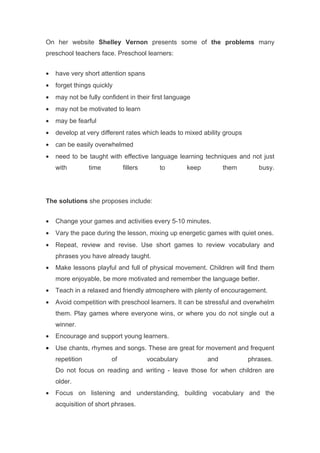
Effective Language Learning Techniques for Preschool Teachers
- 1. On her website Shelley Vernon presents some of the problems many preschool teachers face. Preschool learners: • have very short attention spans • forget things quickly • may not be fully confident in their first language • may not be motivated to learn • may be fearful • develop at very different rates which leads to mixed ability groups • can be easily overwhelmed • need to be taught with effective language learning techniques and not just with time fillers to keep them busy. The solutions she proposes include: • Change your games and activities every 5-10 minutes. • Vary the pace during the lesson, mixing up energetic games with quiet ones. • Repeat, review and revise. Use short games to review vocabulary and phrases you have already taught. • Make lessons playful and full of physical movement. Children will find them more enjoyable, be more motivated and remember the language better. • Teach in a relaxed and friendly atmosphere with plenty of encouragement. • Avoid competition with preschool learners. It can be stressful and overwhelm them. Play games where everyone wins, or where you do not single out a winner. • Encourage and support young learners. • Use chants, rhymes and songs. These are great for movement and frequent repetition of vocabulary and phrases. Do not focus on reading and writing - leave those for when children are older. • Focus on listening and understanding, building vocabulary and the acquisition of short phrases.
- 2. • Concentrate also on speaking practice, starting with single words and short phrases, and gradually moving onto longer sentences and questions. • Avoid abstract concepts and focus on concrete items that children understand and relate to. For example, start with familiar topics such as colours, numbers, greetings, animals, fruit, food and drink, families, body parts, shapes, clothing, the weather, days of the week and everyday sentences and phrases. • Use please and thank you and be positive. Focus on positive behaviour rather than telling children what not to do. • Be prepared - practise telling stories before you go into class and have your picture flashcards and materials ready. Mix up active participation and listening. If the children become restless do something active. • Be flexible. If something is not working then change the game or activity. • Involve shy children - help them to express themselves. • Bring in real objects whenever possible, such as clothes to dress up in, or props for acting out little plays or stories. When you cannot bring in realia use whatever objects are available in your class, and use colourful pictures of real items. • Use stories. Stories are a great resource for preschool learners, who will want to hear the same tales told repeatedly.